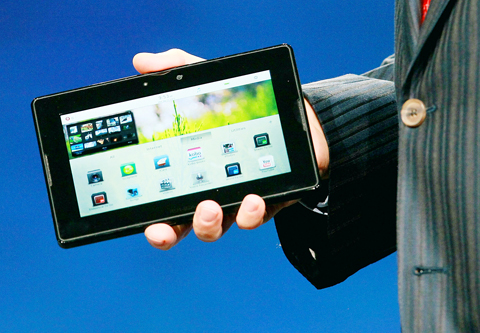Research In Motion (RIM) unveiled a tablet computer aimed at its core business customers, as it tries to gain a foothold in a fast-growing market dominated by Apple’s iPad.
The BlackBerry PlayBook has a 7-inch (18cm) touchscreen, dual high-definition cameras and boasts support from corporate IT departments. It has Wi-Fi and Bluetooth, but needs to link with a BlackBerry smartphone to access a cellular network.
RIM on Monday emphasized the PlayBook’s “uncompromised” Web browsing experience — which, unlike the iPad, supports Adobe’s widely used Flash multimedia software — as well as the tablet’s security.

PHOTO: AFP
RIM expects to ship the device to corporate customers and developers next month, and to consumers starting early next year, meaning it will miss a crucial sales window in the holiday buying season. In the meantime, many competing tablets are expected to hit the market.
The company also did not reveal how much it would charge for the PlayBook, and pricing could be an important factor in its adoption.
Shares of RIM rose 2 percent before paring gains slightly in after-hours trade following the announcement, made at the company’s annual developers’ conference in San Francisco.
The Waterloo, Ontario-based company has recently struggled to impress investors and analysts, who mostly shrugged off the August launch of its Torch smartphone, and fretted about eroding support among its core corporate clientele.
While RIM is pitching the PlayBook as the evolution of its corporate heritage, its hopes the powerful processor and media offerings lure consumers too.
“They talk enterprise, but this will get bought by individuals and used for business,” IDC analyst Stephen Drake said from the floor of the presentation.
The market for tablets — touchscreen devices larger than a smartphone and smaller than a laptop — has exploded since Apple launched its iPad in April. Samsung and Dell have launched competing devices in the past two months, with others expected from Hewlett-Packard and Toshiba.
Industry analysts expect global tablet sales of 40 million to 50 million units next year, with the market still dominated by the iPad.
The PlayBook can mirror a BlackBerry phone, giving users a bigger screen to view media and edit documents, and wipes out all corporate data once the link between the two devices is broken. It weighs 400g and will launch with a dual-core, 1 gigahertz processor running a QNX operating system. RIM acquired QNX less than a year ago.

MORE VISITORS: The Tourism Administration said that it is seeing positive prospects in its efforts to expand the tourism market in North America and Europe Taiwan has been ranked as the cheapest place in the world to travel to this year, based on a list recommended by NerdWallet. The San Francisco-based personal finance company said that Taiwan topped the list of 16 nations it chose for budget travelers because US tourists do not need visas and travelers can easily have a good meal for less than US$10. A bus ride in Taipei costs just under US$0.50, while subway rides start at US$0.60, the firm said, adding that public transportation in Taiwan is easy to navigate. The firm also called Taiwan a “food lover’s paradise,” citing inexpensive breakfast stalls

TRADE: A mandatory declaration of origin for manufactured goods bound for the US is to take effect on May 7 to block China from exploiting Taiwan’s trade channels All products manufactured in Taiwan and exported to the US must include a signed declaration of origin starting on May 7, the Bureau of Foreign Trade announced yesterday. US President Donald Trump on April 2 imposed a 32 percent tariff on imports from Taiwan, but one week later announced a 90-day pause on its implementation. However, a universal 10 percent tariff was immediately applied to most imports from around the world. On April 12, the Trump administration further exempted computers, smartphones and semiconductors from the new tariffs. In response, President William Lai’s (賴清德) administration has introduced a series of countermeasures to support affected

CROSS-STRAIT: The vast majority of Taiwanese support maintaining the ‘status quo,’ while concern is rising about Beijing’s influence operations More than eight out of 10 Taiwanese reject Beijing’s “one country, two systems” framework for cross-strait relations, according to a survey released by the Mainland Affairs Council (MAC) on Thursday. The MAC’s latest quarterly survey found that 84.4 percent of respondents opposed Beijing’s “one country, two systems” formula for handling cross-strait relations — a figure consistent with past polling. Over the past three years, opposition to the framework has remained high, ranging from a low of 83.6 percent in April 2023 to a peak of 89.6 percent in April last year. In the most recent poll, 82.5 percent also rejected China’s

PLUGGING HOLES: The amendments would bring the legislation in line with systems found in other countries such as Japan and the US, Legislator Chen Kuan-ting said Democratic Progressive Party (DPP) Legislator Chen Kuan-ting (陳冠廷) has proposed amending national security legislation amid a spate of espionage cases. Potential gaps in security vetting procedures for personnel with access to sensitive information prompted him to propose the amendments, which would introduce changes to Article 14 of the Classified National Security Information Protection Act (國家機密保護法), Chen said yesterday. The proposal, which aims to enhance interagency vetting procedures and reduce the risk of classified information leaks, would establish a comprehensive security clearance system in Taiwan, he said. The amendment would require character and loyalty checks for civil servants and intelligence personnel prior to